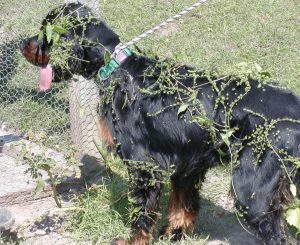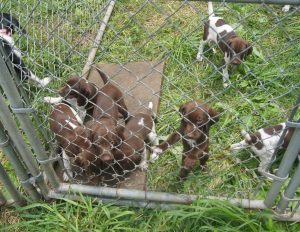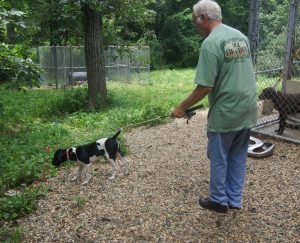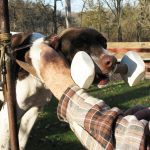Pointing Dog Pointers: The Good Gun Dog
POINTING DOG POINTERS SEPTEMBER 2014
By Bob and Jody Iler
Gun dogs come in all sizes and shapes and are bred for different areas of specialization. The term “gun dog” includes pointing dogs, of course, as well as flushing dogs and retrievers. To build on that, there are many pointing dogs that are great retrievers, and many retrievers that also point! And flushing dogs are notoriously great at finding and bringing dead and crippled birds back.
So, what should you look for in a pointing dog that will make him or her a great “gun dog?” If you’re new to pointing dogs, a good way to begin is first to assess yourself. The good gun dog that will best “fit” you depends largely on the following questions:
- Are you an active or more sedentary type of person?
- How’s your energy level?
- Will your age or health be factors in choosing a hunting dog?
- Do you want a dog with lots of snap or a more deliberate type of hunting dog?
- How much time do you have to devote to training, exercising, and grooming of your hunting dog?
- What kind of birds do you hunt? How often?
- What kind of terrain will you be hunting in?
- What type of range would you like your dog to demonstrate when hunting?
- Will your dog live in the house with you or spend much of its time in an outdoor kennel and run?
- How much money do you want to spend in purchasing your pointing dog?
- Are you interested in pedigrees or simply prefer a good pup from hunting parents?
Once you’ve made a general self-assessment, you’ll have a better idea of what to look for in a pointing dog that will become your ideal gun dog. Your next step will be to do some research on the many pointing breeds available.
You may be the practical sort and look first at the breed size that appeals to you and your lifestyle. Though all of the pointing breeds will thrive on living in the house with you, some folks may prefer a smaller dog such as a Brittany or French Brittany that won’t take up a lot of room.
If you don’t like to spend a lot of time on grooming, you may prefer a short-haired breed like a Viszla, German shorthaired pointer or English pointer. With longer coats, setters will require more grooming and cleanup, especially after field work. German wirehaired Pointers, with the right sort of dense, wiry coat, make for a good compromise, as their coats usually clean up fairly well without too much maintenance; yet they have a thicker coat than their short-haired counterparts. Size and grooming care are realistic considerations when you’re considering a hunting partner that may share your digs with you for a decade or more.
If your gun dog is going to live in an outdoor kennel, he’ll need a warm, dry and insulated house regardless of his coat, built in accordance with his size. He’ll also need a safe, well-constructed kennel run, with a mix of sun and shade, that affords him plenty of exercise and relaxation.
After the practical considerations, next on your research agenda is to learn about the dominant characteristics that reflect each breed. Obviously, all pointing dogs should point, have a good nose, and a strong desire to hunt. But the bloodlines of some pointing dog breeds also produce good retrievers too. Other lines are bred to produce lots of range and drive, meaning that the cute little pup that you just have to have may turn out to be a dog that runs into the next county before she tires out.
Naturally you’re going to hear glowing accolades about each breed from those who own them, including the authors of this column! But again, go back to your list and talk to a lot of breeders and trainers, as well as the folks who’ve bought and raised dogs from those breeders or trainers. This is where you’ll find invaluable information. If you’ve candidly assessed yourself and researched the pointing breeds in depth, you’ll narrow your search down to the one that offers the best chance of providing you with a good match and an eventual great gun dog partner.
Now, you’ll make a checklist of the traits that you’re looking for in a good pointing dog pup, plus some other considerations, that will go something like this:
- Is the pup “sound”?
- Is the pup bold and inquisitive?
- Does the pup seem more laid back and relaxed?
- Have you checked out the pup’s health history and that of the parents?
- Have you seen the parents in the field?
- Is the pup well “put-together?” Does he/she have good conformation?
- What type of the coat does the pup have/will have?
- What about the size of the pup when he/she is fully grown?
- Does the pedigree reflect time and effort spent in putting field titles on the pup’s ancestors?
- Does the pup have a good nose?
- Does the pup have pointing instinct?
- Does the pup have retrieving ability? And, how important is this to you?
You’ll be able to determine some of these traits early on, even in young pups of seven or eight weeks of age. But since you’re a novice, it’s better to have an experienced person accompany you on your search, and be sure to consider the breeder’s opinion on which pup he or she thinks might be a good fit for you as well. If the pup you’re looking at is older, say four or five months of age, you should be able to get an even better idea of these traits, through a short demonstration in the field by the breeder or trainer.
Some people just don’t have the time, ability, or desire to train and develop a young pup. For these folks, buying a started or finished dog may be a feasible option. The started or finished dog will need acclimation to its new home, and time spent bonding with you, just as a young pup does, but this dog will be ready to take out and hunt come hunting season. Naturally these dogs will come at a higher price than a puppy.
For the person just getting into pointing dogs, knowing what a started or finished dog does is very important, as well as knowing the difference between the two. Next month, we’ll talk about the started and finished dog—and whether one of these dogs may be a good option for you!
Pointing Dog Pointers features monthly training tips by Bob and Jody Iler, who own Green Valley Kennels in Dubuque, Iowa. Bob and Jody have trained pointing dogs for over 35 years and have written many articles for The Pointing Dog Journal.







